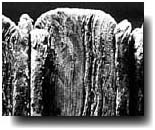
As the circuit supplants the printed page, and as more and more of our communications involve us in network processes - which of their nature plant us in a perpetual present - our perception of history will inevitably alter. Changes in information storage and access are bound to impinge on our historical memory. The depth of field that is our sense of the past is not only a linguistic construct, but is in some essential way represented by the book and physical accumulation of books in library spaces. In the contemplation of the single volume, or mass of volumes, we form a picture of time past as a growing deposit of sediment; we capture a sense of its depth and dimensionality. Moreover, we meet the past as much in the presentation of words in books of specific vintage as we do in any isolated fact or statistic. The database, useful as it is, expunges this context, this sense of chronology, and admits us to a weightless order in which all information is equally accessible.